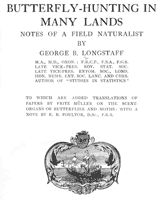 |
|
Butterfly
collecting was a common gentleman's hobby in Conan Doyle's
time |
"Oh, excuse me an instant! It is surely Cyclopides."
A small fly or moth had fluttered across our path,
and in an instant Stapleton was rushing with extraordinary energy
and speed in pursuit of it.
As he often did, Conan Doyle apparently pulled a species name out
of the air to designate Stapleton's butterfly. This species name
is outdated, and was used to designate a group of species of insect,
rather than one specific type. In any case, no insect named Cyclopides
is found in Dartmoor at any time of the year. Many other butterfly
species do make the moor their home.
"Will you come upstairs,
Dr. Watson, and inspect my collection of lepidoptera?"
Butterfly collecting was one of the most popular naturalist crazes
of Victorian times. Many private gentlemen had museum-quality collections
assembled through collection and purchase.
One page is missing….
Which page this could have been, no one knows, since the report
seems complete as it stands. Watson never mentions it again, but
Sherlockians have argued over which information might have been
missing from Watson's report.
The strange thing is that they should have lived so thickly on what must always have been most unfruitful soil.
Climate changes, overfarming, and the stripping away of the forest (completed in the Middle Ages) have made Dartmoor more uninhabitable now than in prehistoric times; however, over 33,000 people still live there.
He has been excavating a barrow at Long Down, and has got a prehistoric skull which fills him with great joy.
A barrow is a prehistoric burial mound. Earthen burial mounds are among the only Neolithic (4,500 to 2,300 B.C.) remains on the moor, although a few stone rows also date from this period.
…there are rumours that he intends to prosecute Dr. Mortimer for opening a grave without the consent of the next-of-kin, because he dug up the neolithic skull in the barrow on Long Down. He helps to keep our lives from being monotonous and gives a little comic relief where it is badly needed.
As the self-appointed gadfly of the neighborhood, Mr. Frankland's frivolous lawsuits are often based on literal (and absurd) interpretations of the law.
…and sometimes I suspect Barrymore of being a domestic tyrant.
Watson uses a euphemism to express his suspicion that Barrymore
beats his wife. In England at the turn of the 20th century,
married women have gave up all property rights upon marriage, and
they could only obtain a divorce after proving adultery and
physical cruelty. Conan Doyle, who believed that women should not
have the vote because they did not pay taxes, championed divorce
law reform. Female characters under the power of a husband who is
a psychological bully often appear in Conan Doyle's work. In his
private life, Conan Doyle did not take advantage of his greater
access to divorce as a man: far from attempting to divorce his first
wife, even when he fell in love with another woman, he did all he
could to cure his wife's tuberculosis, and refused to have an affair. |







